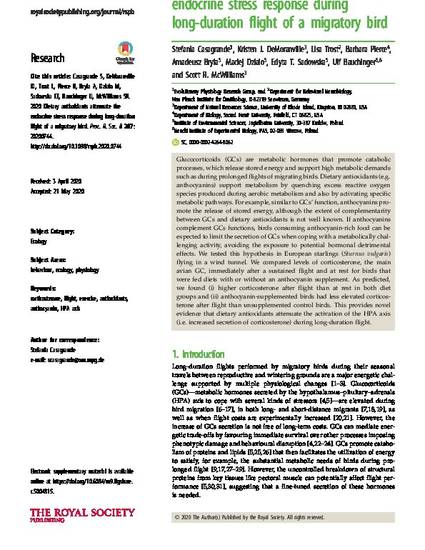
Glucocorticoids (GCs) are metabolic hormones that promote catabolic processes, which release stored energy and support high metabolic demands such as during prolonged flights of migrating birds. Dietary antioxidants (e.g. anthocyanins) support metabolism by quenching excess reactive oxygen species produced during aerobic metabolism and also by activating specific metabolic pathways. For example, similar to GCs’ function, anthocyanins promote the release of stored energy, although the extent of complementarity between GCs and dietary antioxidants is not well known. If anthocyanins complement GCs functions, birds consuming anthocyanin-rich food can be expected to limit the secretion of GCs when coping with a metabolically challenging activity, avoiding the exposure to potential hormonal detrimental effects. We tested this hypothesis in European starlings (Sturnus vulgaris) flying in a wind tunnel. We compared levels of corticosterone, the main avian GC, immediately after a sustained flight and at rest for birds that were fed diets with or without an anthocyanin supplement. As predicted, we found (i) higher corticosterone after flight than at rest in both diet groups and (ii) anthocyanin-supplemented birds had less elevated corticosterone after flight than unsupplemented control birds. This provides novel evidence that dietary antioxidants attenuate the activation of the HPA axis (i.e. increased secretion of corticosterone) during long-duration flight.
Casagrande, S., DeMoranville, K. J., Trost, L., Pierce, B., Bryła, A., Dzialo, M., Sadowska, E. T., Bauchinger, U., McWilliams, S. R. (2020). Dietary antioxidants attenuate the endocrine stress response during long-duration flight of a migratory bird. Proceedings of the Royal Society B, 287(1929):20200744. doi: 10.1098/rspb.2020.0744

Epub 2020 Jun 17.
© 2020 The Author(s) Published by the Royal Society. All rights reserved.
Electronic supplementary material is available online at https://doi.org/10.6084/m9.figshare. c.5004815.